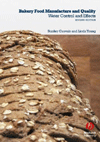Controlling foreign material contamination

The number of firms recalling product due to foreign material contamination has increased by 157% in the past six years. While metal fragments have been the leading cause, there have been several food product recalls related to plastic fragments. The industry has also seen four massive recalls during the past two years due to pieces of stainless-steel wire contamination.
Bakery and snack products are at the top of the Food and Drug Administration’s (FDA) food recall list due to foreign materials. Metal and plastic particles have accounted for 83% of bakery and snack product recalls; 11% were due to unknown materials. Five percent of the foreign material recalls were related to glass particles and insects.
These foreign material contaminations have affected a wide range of bakery and snack products by showing up in ingredients ranging from flour to spices. In addition, bakers and snack food manufacturers have contributed their own foreign materials during their processing operations.
As operational practices have changed over the years, we find more plastics in our food operations that bring new challenges not only in the manufacturing plant, but also in consumer packaging materials. Plastic films used within the plant and in consumer packaging can present choking hazards by blocking a person’s airway. Plastic liners used in ingredient containers should have bold, contrasting colors, so pieces of them are easy to identify in products.
Some equipment manufacturers have tried using metal-impregnated plastic to utilize the metal detection systems on processing and packaging lines. Thus, they are able to detect not only metal but also plastic parts.
Preventive measures
The growing number of bakers and snack manufacturers involved in recalls due to foreign material suggests the need to review risks associated with these products and processing operations. For example, are you properly placing adequate control measures to address hazards associated with your operations? Management of the foreign material control program is critical. Are the devices that you’re using routinely checked according to the parameters set in the written control program? Are employees responsible for inspecting your systems properly trained? What do their reports look like? Are your devices for controlling foreign materials effective? Are the devices used in your operation the state-of-the-art for your product?
Controlling physical hazards in a food production facility involves the attention of all employees. Sanitation crews need to be trained and reminded that they should look for evidence of metal and plastic wear points on equipment as they clean. When the lack of these procedures is observed, the information should be called to the attention of the production and maintenance staff so corrective actions can be taken.
Consider addressing the topic of controlling foreign material contamination at your next staff meeting. The time taken can prevent a consumer complaint and a costly product recall.
Author Gale Prince is founder and president of SAGE Food Safety Consultants, LLC, Cincinnati, which offers guidance and solutions to issues such as crisis management, food safety, regulatory compliance and quality assurance.
Looking for a reprint of this article?
From high-res PDFs to custom plaques, order your copy today!









